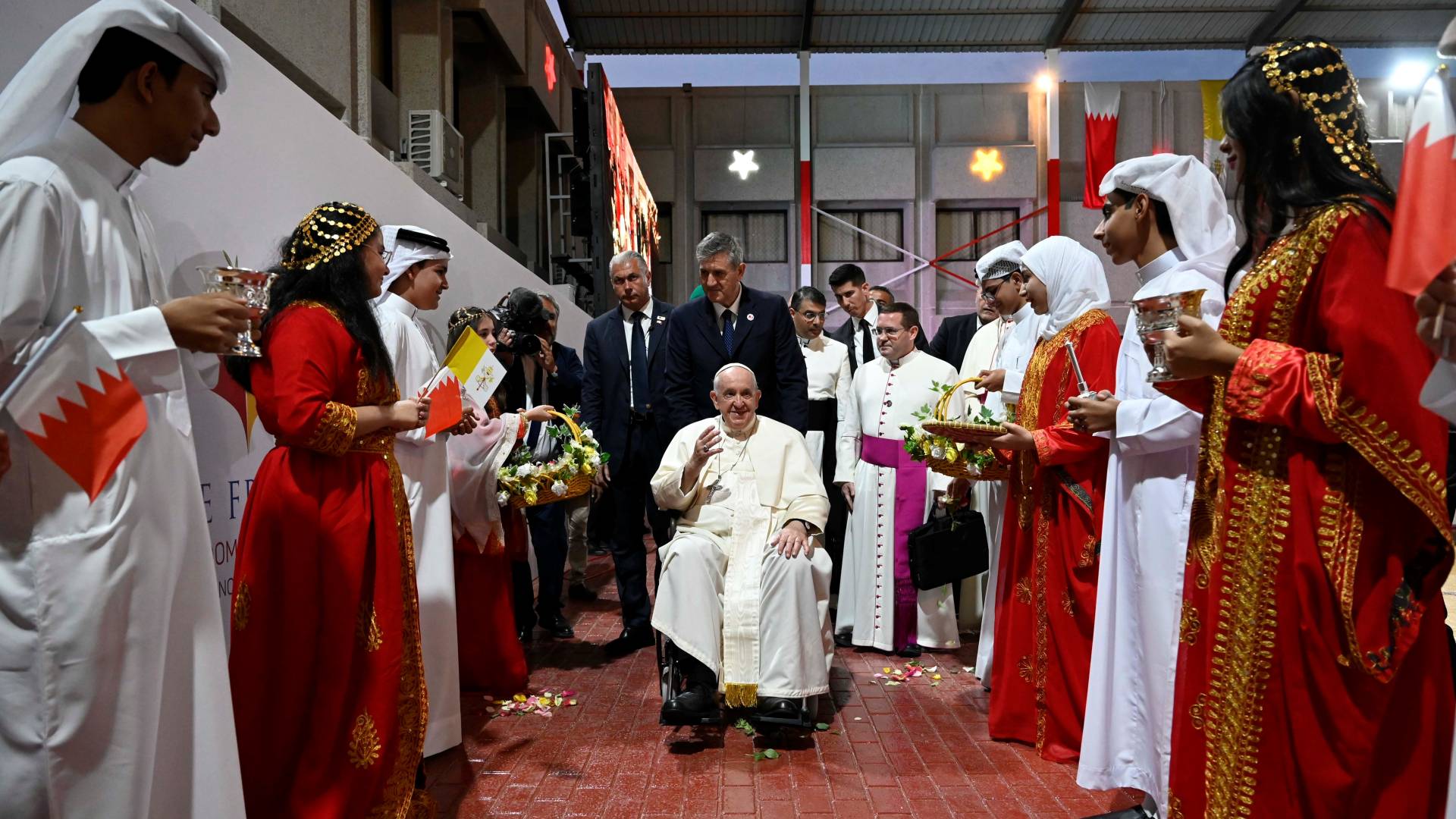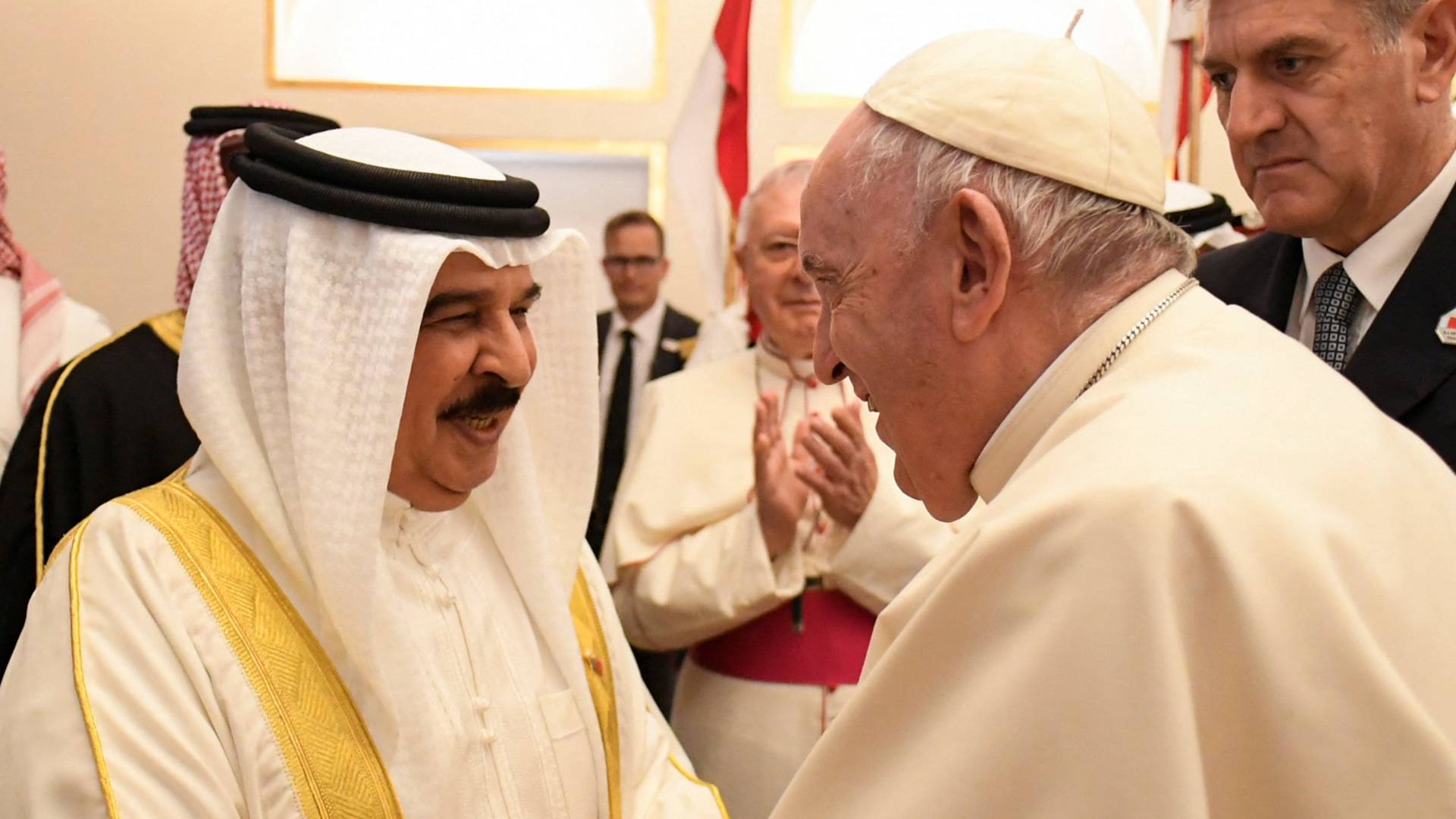

Pope's General Audience - The Apostolic Journey to the Kingdom of Bahrain
Pope Francis
Wednesday, November 9, 2022

Pope Francis waves as he arrives for a meeting with young people at Sacred Heart School in Awali, Bahrain, Nov. 5, 2022. (CNS photo/Vatican Media)
In today's General Audience, Pope Francis reflects on his Apostolic Visit to Bahrain as a time of "dialogue," "encounter" and "journey." He says that "dialogue is 'the oxygen of peace,'" that "encounters can form stronger relationships," and that this "first visit of a Pope in Bahrain represents a new step on the journey between Christian and Muslim believers."Dear brothers and sisters, good morning! It’s a bit cold, isn’t it? But it’s beautiful. Before beginning to speak about what I have prepared, I would like to draw attention to these two children who have come up here. They did not ask permission. They did not say, “I am afraid”. They came up directly. This is how we need to be with God: direct. They have given us an example of how we need to behave with God, with the Lord: go ahead! He is always waiting for us. It was good for me to see the trust of these two children. It was an example for all of us. This is how we always need to draw near the Lord – freely. Thank you. Three days ago, I returned from my trip to the Kingdom of Bahrain which I truly knew nothing about. I did know really know what that kingdom is like. I would like to thank everyone who accompanied this visit through the support of their prayers, and to renew my gratitude to His Majesty the King, the other Authorities, the local Church and the people, for their warm welcome. And I would also like to thank those who organize these journeys. To do this there is a movement of people, the Secretary of State works a lot to prepare the discourses, to prepare the logistics, everything, there is a lot of movement…then the translators…and then, the corps of the Gendarmeria, the corps of the Swiss Guards who are wonderful…. Everything. It is a tremendous amount of work! To everyone, to all of you, I would like to thank you publicly for all that you did so that the Pope’s journey would go well. Thank you. It comes spontaneous to ask why the Pope wanted to visit this small country with such a large Islamic majority? There are so many Christian countries – why not go first to one or two of them? I would like to respond through three words: dialogue, encounter and journey. Dialogue: the opportunity for the long-desired journey was afforded by the invitation of the King to a Forum on dialogue between the East and the West, a dialogue that seeks to discover the richness that other peoples, traditions and beliefs possess. Bahrain, an archipelago formed by many islands, helps us understand that it is not necessary to live by isolating ourselves, but by coming closer. In Bahrain, which is made up of islands, they came close, didn’t they, they brush up against each other. The cause of peace necessitates this, and dialogue is “the oxygen of peace.” Don’t forget this. Dialogue is “the oxygen of peace.” Even for peace in our homes, right? If there is war there between husband and wife, with dialogue they can move ahead in peace. In the family, dialogue, for peace is preserved through dialogue. Almost sixty years ago, the Second Vatican Council, speaking about building an edifice of peace, stated that “it certainly demands that [men and women] extend their thoughts and their spirit beyond the confines of their own nation, that they put aside national selfishness and ambition to dominate other nations, and that they nourish a profound reverence for the whole of humanity, which is already making its way so laboriously toward greater unity” (Gaudium et spes, 82). This is what the Council says. I sensed this need in Bahrain and I hoped that religious and civil leaders throughout the world might be able to look beyond their own borders, their own communities, to care for the whole. This is the only way to confront certain universal issues, for example, that God is being forgotten, the tragedy of hunger, the care of creation, peace. These things can be thought of all together. In this sense, the Forum for dialogue entitled: “East and West for Human Coexistence” – this was the title, “East and West for Human Coexistence” – encouraged the choice of the path of encounter and the rejection of confrontation. How much we need this! There is such a need to encounter each other. I have in mind the insanity of war – insane – of which battered Ukraine is a victim, and of many other conflicts, that will never be resolved through the infantile logic of artillery, but only with the gentle power of dialogue. But in addition to Ukraine, which is being tormented, this land. But let’s think of the wars that last for years, and let’s think of Syria – more than 10 years! -- let’s think, for example, of Syria, let’s think of the children in Yemen, let’s think of Myanmar: all over the place! Right now, Ukraine is closer. And what does war do? It destroys, it destroys humanity, destroys everything. Conflicts are not to be resolved through war.

Pope Francis and Bahrain’s King Hamad bin Isa Al Khalifa greet each other at a farewell ceremony for the pope at Sakhir air base in Awali Nov. 6, 2022. (CNS photo/Vatican Media via Reuters)
Related Articles:
<<













